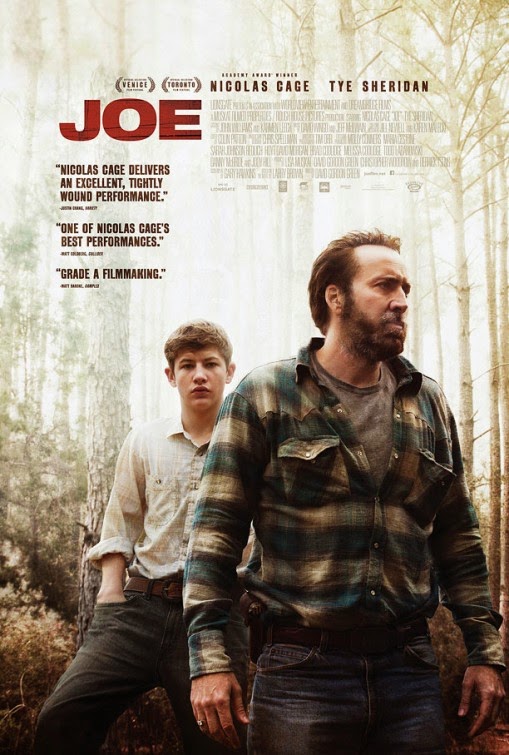Muddy Lives: Nicolas Cage returns to form in grim, deeply felt "Joe"
Joe (2014)
117 min., rated R.
Nicolas Cage may have one of the stranger career trajectories of any actor. He was at the top of his game in "Leaving Las Vegas," "Adaptation," "Matchstick Men," and "The Weather Man" and then really went for it in Werner Herzog's "Bad Lieutenant: Port of Call - New Orleans," but then cashed it all in with a slew of dopey paycheck movies ("The Wicker Man" and two "Ghost Rider" movies and "Season of the Witch" and…). Still chugging along, Cage must not care what the world thinks of him, which is a perfect way to describe the attitude of the namesake in "Joe." Along with Cage, director David Gordon Green (2013's "Prince Avalanche") has wonkily hopped around from commercial comedies to indie projects, and his latest goes more in line with what he made his name on.
Joe Ransom (Cage) is a world-weary ex-con living in a rural, podunk Texas town, where he manages a crew of hard-working men to poison already-dying trees and clear the land for new ones. When respectful 15-year-old Gary Jones (Tye Sheridan) comes looking for a job, Joe gives the kid a chance, especially when he learns that Gary's wretched, always-intoxicated, deadbeat father Wade (Gary Poulter) beats him. Though gainfully employed, Joe has his own problems, like drinking, smoking and making frequent visits to the local brothel. Seeing that Gary is willing to work and works hard, he gives Gary's father a job, too, but the drunkard spells trouble, doing nothing but drink out of the other works' water jugs. As Joe begins to take Gary under his wing, he can't mind his business for too much longer.
Based on Larry Brown's 1991 novel and from a screenplay by Gary Hawkins, "Joe" is, all at once, a gritty slice-of-life in the Texas backcountry and a redemption yarn, much like 2013's superior "Mud" with Matthew McConaughey and this film's Tye Sheridan whose character gains an unorthodox father figure. Working with his usual cinematographer Tim Orr, director Green captures a blue-collar tapesty with lived-in authenticity and texture, as well as an extra verisimilitude from casting a few real folks. Everyone seems to actually inhabit this seedy town of messy convenience stores, pink-neon lit whorehouses, and chained-up pitbulls. Peppering metaphors that aren't too heavy-handed (a poison-releasing ax and a poisonous snake are not unlike some of the toxic people), he mainly focuses on his characters and the interconnectedness of their hardscrabble lives.
Finally returning to form, Cage turns in his most controlled and tender performance to date, and that's a revelatory statement. That's not to say he doesn't have a few cageless freak-out moments, but they completely fit for the hot-tempered character written on the page. Shaded with humanity and inner demons by Cage, his Joe has made mistakes in the past and is still far from being an angel—he teaches Gary how to drive with a beer in his hand—but he remains a decent, mostly likable man who also packs some heat when violence comes his way. Hopefully he won't be typecast as white-trash lads with "Mud" and now this, but Sheridan continues riding on his wave of promise as a young actor without an ounce of affectation. Gary can certainly hold his own, having lived in a shack with his despicable father, drugged-out mother and mute sister, but all of his strength will soon wear out. Gary Poulter, a real homeless man who died two months after shooting completed, is remarkably monstrous as Gary's father Wade, or "G-Daawg" (the name printed on the jacket he wears). Early on, there is a glimpse of humanity that's now long gone, but Wade is a lazy, abusive drunkward who's willing to sell his daughter and kill another bum for a bottle of wine.
Frequently grim but ultimately hopeful, "Joe" takes a while to find its footing, but the film is driven by its titular character after all. With Green getting the rough-hewn milieu spot-on, Hawkins' screenplay grounds the central characters, but the cops do more harassing than protecting and some of the peripheral yokels are undefined. Also, it might be a real small town, but how convenient that the angry Willie-Russell (Ronnie Gene Blevins) shoots Joe in the shoulder one day, then runs into Gary on the bridge. Inevitably, Joe's past will catch up with him and later collide with Gary and his father. Even if you know what is coming and won't be surprised how things end up, it's all in how we get there and it gets there with a stream of tension and ugly violence. Because of Joe standing in as a makeshift father figure to Gary, "Joe" holds a deeply felt impact. This might be familiar Southern Gothic stuff, but it's well-told, well-directed, and well-acted. It also doesn't hurt that Cage redeems himself, reminding us that when he feels like challenging himself there's still some nuance and subtlety left in him.
Grade: B











Comments
Post a Comment